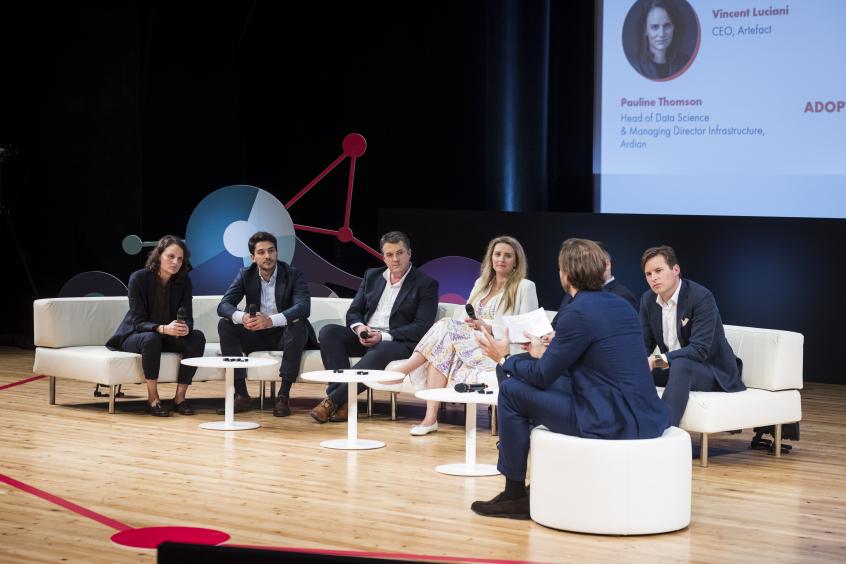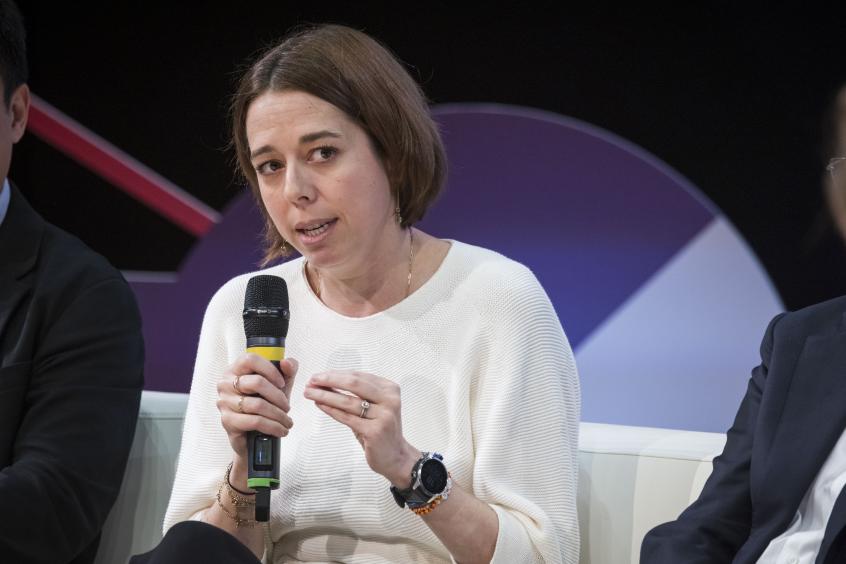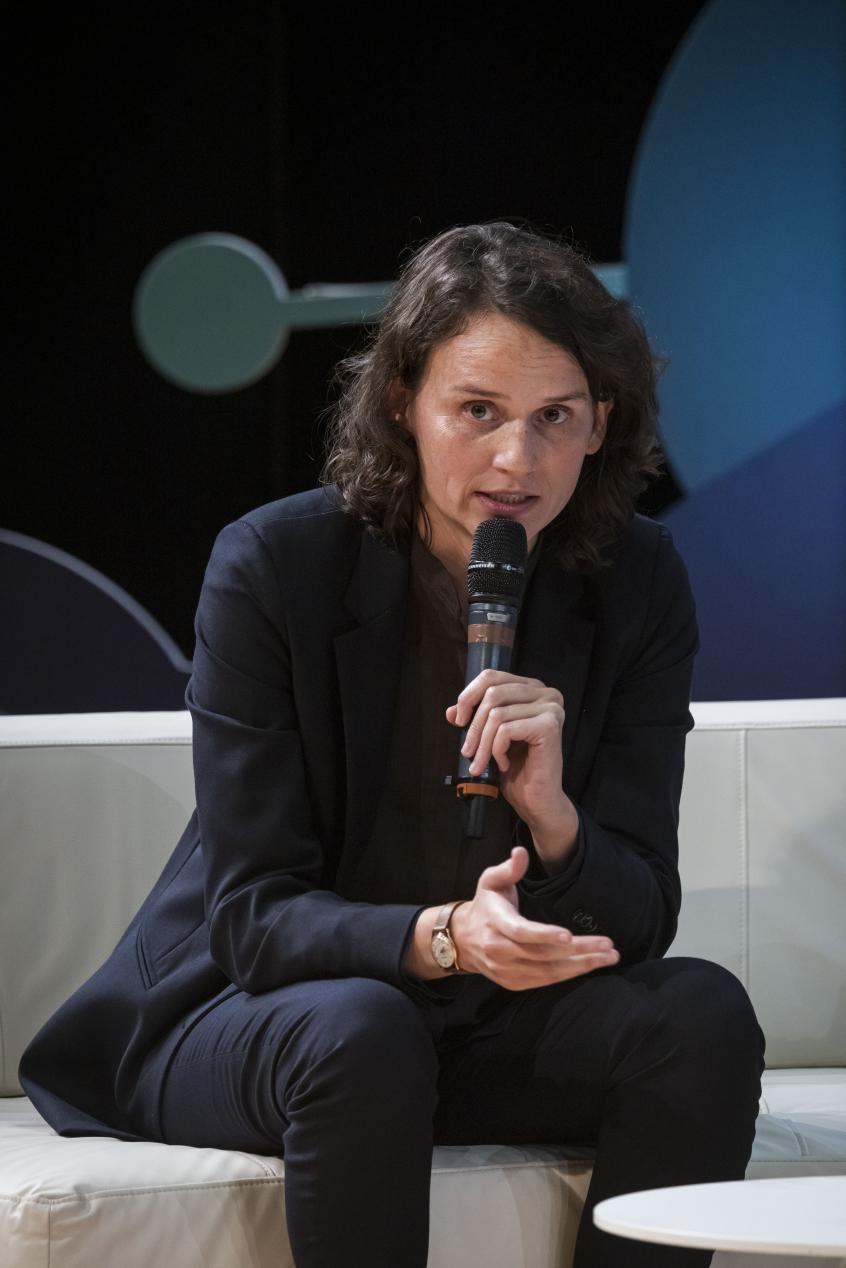The AI imperative: rethinking alternative investment
Responsible finance, Market watch
The AI imperative: rethinking alternative investment
-
13 December 2024
-
Technology & Innovation, Infrastructure, Buyout, Expansion, Growth, Ardian Semiconductor
Reading time: 9 minutes
REPLAY ► Ardian Conference AI x AI
The AI imperative: rethinking Alternative Investment
Benefits and challenges of AI’s exponential growth for the economy
Benefits and challenges of AI’s exponential growth for the economy
From a global perspective, AI has already had a transformative impact on the finance, health and retail sectors in particular.
In his opening remarks, Mathias Burghardt, Executive Vice-President and CEO of Ardian France observed that, from a global perspective, AI has already had a transformative impact on finance, health and retail. AI has stimulated productivity growth not just by automating tasks involved in the production of goods and services, but also by generating new ideas for the business models of companies and investment funds.
This technological breakthrough forces companies into a race to innovate, striving to stay competitive as each new discovery makes the previous one obsolete. Academics Philippe Aghion and Peter Howitt described this process of “creative destruction” in entrepreneurship in 1987.
Philippe Aghion, Economist and Professor at the Collège de France explored how this concept applies to the development of AI during his keynote address to the conference, highlighting the risk that success in the AI innovation race could be dominated by a handful of players.
“Let us remember the computer revolution: Google or Amazon were far better at leveraging the technology than their competitors. The mergers and acquisitions carried out by these companies drove the growth process. Since competition policy was not designed to regulate such practices, the leading companies ended up discouraging the entry of new firms. This scenario is even more likely to recur with AI,” he said. Appropriate competition policy is therefore needed to facilitate access to data and enable other participants to exist.
To illustrate how AI is changing the job market and corporate strategies, Aghion referred to a study of 9,000 companies with 50 or more employees, comparing AI adopters with non-adopters. This found that adoption had a positive impact overall on employment.
Companies embracing AI see a boost in their productivity, which makes them more competitive.
They offer better value for money, and demand for their products goes up, so they hire more people. “That productivity effect more than offsets the substitution effect,” he said.
However, not all job categories are affected in the same way. By automating some repetitive tasks, AI supports people in management roles by freeing them to spend more time on adding value. Conversely, automation creates replacement risk for mid-level admin and sales positions.
How AI is transforming asset managers
How AI is transforming asset managers
Among asset managers, AI is enhancing their investment teams’ analytical capabilities and enabling them to support portfolio companies more effectively. AI encourages the collection and rapid analysis of huge volumes of strategic data, enabling managers to make better informed decisions about their investments and to sift through much larger groups of companies for potential investment opportunities.
“Ardian employees can use our Gaia application, which we developed in partnership with Artefact [an Ardian portfolio company], to safely download and analyze documents, get summaries and make comparisons. This gives them a competitive edge,” argued Pauline Thomson , Head of Data Science et Managing Director at Ardian.
There is a challenge of speed of transaction execution in the market. If everyone is able to scan through a data room in two hours when it takes you two months, you are out of the market. So you need to stay ahead of this trend.
However, data confidentiality and security are key operational challenges. This is why it is important for asset managers to develop in-house AI tools to ensure sensitive information is not transferred outside the firm’s systems for processing. “We believe that internalizing this independent platform is key to unlocking the full benefits of AI,” she added. Given the high energy and financial costs of developing and using AI tools, Thomson also stressed the importance of selecting use cases that will deliver meaningful value.
While AI can make collecting and analyzing large volumes of data much more efficient, it is still no substitute for human beings for complex decisions. Instead, AI needs to be treated as a powerful tool to support human decision making.
The idea is not to fully automate work processes, but rather to delegate low value-added tasks while keeping humans involved, especially in final decisions.
How to help portfolio companies leverage AI
How to help portfolio companies leverage AI
But extensive data processing possibilities are not the whole story. High-quality results are what really matter. Claire Calmejane, CEO of CAILEG and Non-Executive Director, Hub France IA, observed that in some use cases, productivity goals are missed, value added is not measured, and expected results are not achieved. She said that before launching any project, “cockpits” must be set up to measure the impact of AI use on income and assess the potential gains in terms of operating costs and efficiency. AI is transforming business models, value chains and working methods. As internal processes are overhauled, senior executives must be actively involved to optimize company management, mitigate risks and leverage the opportunities offered by AI for financial performance.
Fanjuan Shi, CIO and CDO of food retailer Prosol, part of the Ardian Buyout portfolio, suggested that around 60% of the success of Prosol’s AI adoption was due to top and middle management sponsorship of the project and to effective change management programs.
Similarly, panelist Philippe Lamantour, Chief Technology and Cybersecurity Office of Microsoft France, argued that most companies were targeting productivity improvements from their AI programs. He believed they should instead prioritize quality, tracking KPIs such as customer churn and cost of customer acquisition. “Focusing on quality gives you another way of looking at the hundreds of use cases you maybe have listed,” he said.
Ardian is constantly looking to help its companies adopt AI and identify applications that are beneficial to their organizations. For example, since 2020 it has been using the Opta platform to optimize energy output from its portfolio of more than 2.5 GW of renewable-energy assets across 10 countries. Opta gathers data constantly and enables Ardian to identify operational improvements that it then passes on to the individual management teams. The results speak for themselves: thanks to Opta, Ardian’s renewable assets are generating an additional €10 million in net income a year, explained Marion Calcine, Chief Investment Officer in the Infrastructure team and Senior Managing Director at Ardian.
Across the firm’s private equity portfolios, Ardian creates technology roadmaps with each company, helping them identify the most impactful use cases and implement them, explained Clément Marty, Head of Digital Transformation and Managing Director at Ardian. “When companies are still identifying and selecting use cases it’s important to help them identify the things that will be most useful to them and to ensure they can also be implemented. Then you have support on implementation. How do you organize a team? Where do you find the resources and skills required? How do you choose the technology stack? How do you organize the management and stewardship of data? How do you deal with adoption and roll-out?”
-
2.5 GW +
of renewable energy production and storage assets optimized by the Opta platform
-
€10 million
in additional annual net income for Ardian’s renewable assets, thanks to Opta
Investing in AI: a strategic priority for asset managers
Investing in AI: a strategic priority for asset managers
So, AI is progressively impacting alternative investment. But equally, alternative investment is expected to shape AI, setting the stage for new entrants to defy the domination of the tech titans. Convinced of the long-term impact of artificial intelligence, Ardian has invested at virtually every level of the AI technological value chain, as its investment portfolio attests.
In March 2024, Ardian finalized the acquisition of Verne, a leading and sustainable platform of data centers based primarily in Nordic countries. Since its inception in 2012, Verne has pursued the goal of helping customers to reduce their carbon footprint.
Ardian also has investments in Artefact, a leading French AI consultancy, Jakala, an Italian specialist in using AI to drive marketing campaigns, Translated, a global leader in machine/human translation services and Wintics, which develops AI solutions for smart cities such as traffic monitoring tools that help reducing congestion and pollution and integrate non-motorized transport efficiently.
In addition to its portfolio companies with significant AI exposure, the firm also launched a specialist fund in 2023 to back European companies active in the semiconductor value chain. Lise Fauconnier, Senior Managing Director at Ardian Semiconductor, argued that the industry was a complex one for non-specialists to understand. To overcome this, Ardian had joined with Silian Partners, a team of industry veterans, to launch the strategy.
“In semiconductors, it’s all about ecosystems,” she said. “Another feature of the industry is customer concentration, which is often seen as a risk factor in other sectors. Instead, here you need to focus on the quality of your clients and the stickiness of the relationships. Usually, investors look at market share but the most important measure in this industry is share of wallet – how important are you to your clients?
Another feature of the industry is customer concentration, which is often seen as a risk factor in other sectors.
Ardian would like to extend its warmest thanks to the experts who shared their analyses and thoughts and helped us to deepen our understanding of AI’s potential: Mathias Burghardt (Executive Vice-President and CEO of Ardian France), Philippe Aghion (Collège de France), Vincent Luciani (Artefact), Frister Haveman (Gain.pro), Claire Calmejane (CAILEG, Hub France IA), Riaan Potgieter (StepStone Group), Andrea Andorno (SAGAT Capital, Turin Airport), Marco Di Dio Roccazzella (JAKALA), Guillaume Liegey (Explain), Philippe Limantour Ph.D. (Microsoft), Fanjuan Shi, Ph.D. (Prosol), Marion Calcine (Infrastructure, Ardian), Pauline Thomson (Data Science, Ardian), Clément Marty (Digital Transformation, Ardian), Quentin Barenne (Wintics), Christophe Duverne (Ardian Semiconductor), Marco Trombetti (Translated), Dominic Ward (Verne), Lise Fauconnier (Ardian Semiconductor), Jonas Corné (Greenbyte), the Ardian Growth , Expansion and Buyout teams.
















